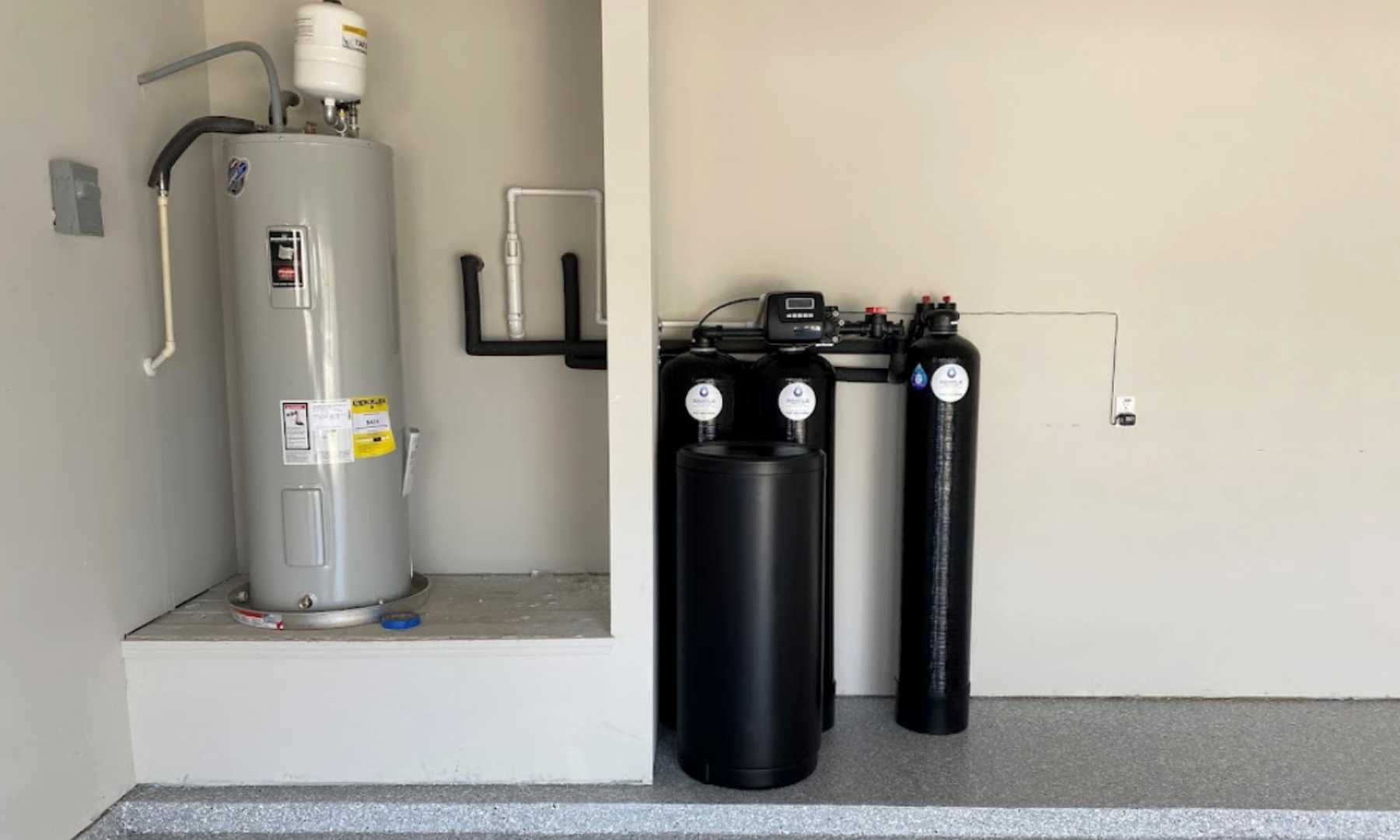Water quality plays a critical role in the comfort and functionality of any home, especially in regions like Houston, where hard water is a common issue. A water softener is a specialized system designed to address this problem, ensuring your household enjoys cleaner, softer water for daily use. For homeowners seeking to improve their water quality, understanding how these systems work and their benefits is essential. This article explores the purpose of water softeners, their importance for homes, and why investing in one can enhance your living experience.
What Is a Water Softener?
A water softener is a device that removes minerals, primarily calcium and magnesium, from hard water through a process called ion exchange. Hard water contains high levels of these minerals, which can cause scaling, reduce appliance efficiency, and affect the quality of water for drinking, bathing, and cleaning. By installing a water softener, households can mitigate these issues, ensuring water is gentler on skin, hair, and household systems.
Water softeners typically consist of a resin tank filled with ion-exchange beads, a brine tank for salt regeneration, and a control valve to manage the softening process. The system filters incoming water, replacing hard minerals with sodium or potassium ions, resulting in softened water that flows through your home’s plumbing. This process not only improves water quality but also protects pipes and appliances from damage caused by mineral buildup.
For Houston homeowners, where water hardness is a prevalent concern, a water softener can be a game-changer. These systems are tailored to address local water conditions, ensuring your home operates smoothly while reducing maintenance costs.
How Does a Water Softener Work?
The functionality of a water softener hinges on ion exchange, a process that effectively eliminates hardness-causing minerals. Hard water enters the system and passes through the resin tank, where calcium and magnesium ions are attracted to resin beads coated with sodium ions. As the water flows through, the hard minerals are swapped for sodium, producing softened water that is distributed throughout the home.
The keyword What Is a Water Softener and Why Do Homes Need It? fits naturally here, as understanding the mechanics of this system is key to recognizing its value. Once the resin beads become saturated with calcium and magnesium, the system regenerates by flushing the beads with a saltwater solution from the brine tank. This restores the beads’ ability to soften water, ensuring continuous performance. Regular maintenance, such as refilling the brine tank with salt, keeps the system running efficiently.
Houston’s water supply, often sourced from groundwater, tends to have elevated mineral content, making water softeners particularly beneficial. By reducing hardness, these systems prevent scale buildup in pipes, water heaters, and appliances, ultimately extending their lifespan and improving household efficiency.
Benefits of Water Softeners for Homes
Investing in a water softener offers numerous advantages that enhance both the quality of life and the longevity of your home’s infrastructure. Here are some key benefits:
- Improved Appliance Longevity: Hard water causes scale buildup in appliances like dishwashers, washing machines, and water heaters, reducing their efficiency and lifespan. A water softener prevents this, saving you from costly repairs or replacements.
- Softer Skin and Hair: Hard water can leave skin dry and hair brittle. Softened water is gentler, improving your skin’s hydration and hair’s texture after showers.
- Cleaner Dishes and Laundry: Soft water enhances the effectiveness of soaps and detergents, resulting in spot-free dishes and brighter, softer clothes.
- Reduced Plumbing Maintenance: By preventing scale buildup in pipes, water softeners reduce the risk of clogs and corrosion, minimizing plumbing repairs.
- Energy Efficiency: Appliances using softened water operate more efficiently, lowering energy consumption and utility bills.
For Houston residents, these benefits translate into tangible savings and comfort, making a water softener a worthwhile investment for any household.
Why Houston Homes Need Water Softeners
Houston’s unique environmental conditions make water softeners particularly essential. The region’s water supply, often drawn from wells or aquifers, contains high levels of calcium and magnesium, leading to hard water that can wreak havoc on homes. Without a water softener, homeowners may face frequent plumbing issues, reduced appliance performance, and discomfort from using hard water for daily tasks.
In addition to protecting household systems, water softeners align with Houston’s focus on sustainability and efficiency. By reducing energy waste and extending the life of appliances, these systems contribute to a greener lifestyle. PHT Security Systems, a trusted provider in Houston, offers professional water softener installation tailored to local water conditions, ensuring optimal performance for your home.
Moreover, softened water enhances the overall living experience, from cleaner laundry to better-tasting drinking water. For families prioritizing health, comfort, and cost savings, a water softener is a practical solution to address Houston’s hard water challenges.
Choosing the Right Water Softener for Your Home
Selecting the appropriate water softener depends on your household’s size, water usage, and specific needs. Here are some factors to consider when choosing a system:
- Household Size: Larger households with higher water consumption require systems with greater capacity to ensure consistent softening.
- Water Hardness Levels: Testing your water’s hardness helps determine the system’s size and strength needed to address mineral content effectively.
- System Type: Options include salt-based, salt-free, and dual-tank systems. Salt-based systems are most common for comprehensive softening, while salt-free systems are ideal for low-maintenance needs.
- Maintenance Requirements: Consider systems with user-friendly features, such as automatic regeneration or low-salt indicators, to simplify upkeep.
- Professional Installation: Working with a trusted provider like PHT Security Systems ensures proper installation and ongoing support for optimal performance.
Houston homeowners should consult with experts to assess their water quality and select a system that aligns with their budget and lifestyle. A well-chosen water softener delivers long-term benefits, from cost savings to improved water quality.
Installation and Maintenance of Water Softeners
Proper installation and maintenance are critical to maximizing the benefits of a water softener. Professional installation ensures the system is correctly integrated into your home’s plumbing, preventing leaks or inefficiencies. During installation, technicians assess your water usage and configure the system to meet your household’s needs.
Maintenance involves regularly refilling the brine tank with salt, cleaning the resin tank, and scheduling periodic inspections to ensure optimal performance. Many systems feature digital controls that alert homeowners when maintenance is required, simplifying the process. For Houston residents, partnering with a local provider like PHT Security Systems guarantees access to expert support and maintenance services, ensuring your water softener remains reliable.
By maintaining your system, you can avoid issues like reduced water flow or ineffective softening, ensuring consistent access to high-quality water for your home.
Cost and Value of Water Softeners
The cost of a water softener varies based on system type, capacity, and installation requirements. Entry-level systems start at a few hundred dollars, while high-capacity or advanced models may cost more. However, the long-term savings often outweigh the initial investment. By preventing scale buildup, water softeners reduce repair costs for appliances and plumbing, lower energy bills, and decrease the need for cleaning products.
For Houston homeowners, the value of a water softener extends beyond financial savings. Improved water quality enhances daily comfort, from softer skin to cleaner dishes, making it a worthwhile addition to any home. With professional installation and support, the system delivers reliable performance, ensuring you get the most out of your investment.
Environmental Impact of Water Softeners
Water softeners contribute to a more sustainable household by improving energy efficiency and reducing waste. Appliances using softened water consume less energy, lowering your carbon footprint. Additionally, by extending the lifespan of appliances and plumbing, water softeners reduce the need for replacements, minimizing environmental waste.
While salt-based systems require periodic salt refills, modern designs are more efficient, using less salt and water during regeneration. For eco-conscious homeowners, salt-free systems offer an alternative that reduces environmental impact while still addressing water hardness. In Houston, where sustainability is increasingly important, a water softener aligns with efforts to create a greener, more efficient home.
FAQs About Water Softeners
What does a water softener do?
A water softener removes calcium and magnesium from hard water, preventing scale buildup and improving water quality for household use.
How often should a water softener be maintained?
Maintenance typically involves refilling the brine tank every 1-2 months and scheduling annual inspections to ensure optimal performance.
Can a water softener save money?
Yes, by preventing appliance and plumbing damage, reducing energy use, and lowering detergent costs, water softeners offer significant savings.
Is a water softener worth it for Houston homes?
Absolutely. Houston’s hard water makes water softeners essential for protecting appliances, improving water quality, and enhancing household comfort.
Do water softeners affect drinking water?
Softened water is safe to drink, though some prefer adding a reverse osmosis system for additional filtration of sodium or other impurities.
How long does a water softener last?
With proper maintenance, a water softener can last 10-15 years, providing long-term benefits for your home.
Conclusion
A water softener is a vital investment for Houston homeowners seeking to address hard water challenges and improve their quality of life. By removing harmful minerals, these systems protect appliances, enhance water quality, and promote energy efficiency. With professional installation and maintenance, a water softener delivers lasting value, ensuring your home remains comfortable and efficient. Whether you’re looking to save on maintenance costs or enjoy softer water for daily use, a water softener is a smart choice for any household.



































